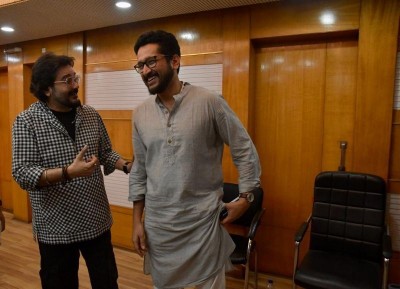
KIFF brings 12 Indian National Award winning films
Kolkata, Nov 11 (IBNS): Cinebuffs of Kolkata and West Bengal will have an opportunity to view 12 Indian films that have won the National Awards in 2016 under different categories and in different languages in the 23rd Kolkata International Film Festival, inaugurated on Friday.
The selected films offers a microcosm of the best in Indian cinema released last year.
The films are Bisorjon (Bengali) directed by Kaushik Ganguly, Maji Rati Keteki (Assamese) directed by Santwana Bardoloi, Neerja (Hindi) by Ram Madhavani, K Sera Sera -Ghodpachen Ghoddtelam (Konkani) directed by Rajeev Shinde, Maheshinte Pratikaram (Malayalam) directed by Dileesh Pothan, Dashakriya (Marathi) directed by Sandeep Bhalachandra Patil, Joker(Tamil) by Raju Murugan, Pelli Choopulu (Telugu) under the direction of Tarun Bhasckar, Mikhil Musale’s Wrong Side Raju (Gujarati), Handuk (Moran) by Jaicheng Jai Dohutia, Reservation(Kannada) directed by Nikhil Manjoo and Madipu (Tulu) directed by Chetan Mundadi.
Bisorjon bagged the Best Bengali Film Award this year at the 64th National Film Awards.
Kaushik Ganguly, who graduated from television to feature films with a sentimental overload to award-winning films for the large screen, has written and directed Bisorjon. He is considered one of the most outstanding filmmakers in contemporary Bengali cinema.
Santwana Bardoloi returned to directing films after three decades with Maji Rati Keteki in Assamese.
Her first film Adajya, starring Tom Alter, also bagged the National Award. This is a nostalgia film that sees the return of a renowned Assamese writer who returns to his hometown for a felicitation programme but is dogged by a strong sense of guilt for something that happened when he was a boy.
Neerja is a fictionalised film on the young air hostess who lost her life in September 1986 when Pan Am Flight 73 from Bombay to New York was hijacked at its transit atJinnah International Airport in Karachi, by Palestinian extremists from Abu Nidal's terrorist outfit.
The film’s racy pace and razor sharp editing enhanced by sterling performances by Sonam Kapoor, Shabana Azmi, Jim Sarbh and others turned it into the most electrifying biopic in Hindi cinema in recent times.
Madipu deals with the celluloid representation of a real incident that happened in Beltangady 50 years ago. It focuses on Bhootharadhane or Bhootha Kola and the relationship between Hindus and Muslims.
The film unfolds the story of a person who has made the worship a part of his life goes into depression when he steps out of it and the film slowly but surely gravitates towards racism and responsibility.
Dashakriya tackles the bold subject of the commercialization of the Dashakriya rituals performed by a certain class of Brahmins when someone dies. These Brahmins are considered to be lower down in the Brahmin hierarchy but that does not stop them from financially exploiting and emotionally blackmailing the grieving family.
Ke Sera Sera narrates the contrasts and contradictions between two people who differ in their ideology and lifestyle and attitude towards life. One believes in changing the circumstances with precise and definite decisions and the other believes in drifting with the situations around that will lead to circumstances decide the course of life.
Reservation elaborates on the repercussions of the reservation policy on the different segments of society explained as a Pan-Indian phenomenon that both challenges and defies any value judgements on the one or the other.
Every single film in this section has a social agenda, understated without melodrama, touching on issues we are all aware of but do not want to take seriously unless it affects us personally.
(Reporting by Shoma A. Chatterji)
Support Our Journalism
We cannot do without you.. your contribution supports unbiased journalism
IBNS is not driven by any ism- not wokeism, not racism, not skewed secularism, not hyper right-wing or left liberal ideals, nor by any hardline religious beliefs or hyper nationalism. We want to serve you good old objective news, as they are. We do not judge or preach. We let people decide for themselves. We only try to present factual and well-sourced news.





